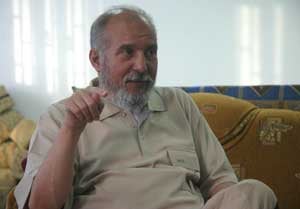Libya’s most prominent political prisoner, Fathi al-Jahmi, faces a possible death sentence for slandering Libyan leader Mu`ammar al-Qadhafi and talking with a foreign official, who may be a U.S. diplomat, Human Rights Watch said today.
“The Libyan government is taking great pains to introduce a democratic face to the world,” said Sarah Leah Whitson, Middle East director of Human Rights Watch. “But it appears willing to execute people for criticizing its leader or talking with a foreign official, which shows how far it has to go.”
Libyan state security has detained al-Jahmi for more than two years. Human Rights Watch called for his immediate release as a sign of Libya’s commitment to reform.
“Libya has renounced terrorism and weapons of mass destruction in its efforts to rejoin the international community,” Whitson said. “Now it should take another step and let peaceful critics speak their minds.”
According to the Libyan government, al-Jahmi’s trial began in late 2005, but the authorities have not made the charges known. His court-appointed lawyer told Human Rights Watch that al-Jahmi faces counts under article 206 of the penal code, among other offenses, but the lawyer did not know the details.
Article 206 of the penal code imposes the death penalty on those who call “for the establishment of any grouping, organization or association proscribed by law,” and on those who belong to or support such an organization.
Human Rights Watch visited al-Jahmi in May 2005 in a special detention facility in Tripoli. He said then that he faced charges on three counts under articles 166 and 167 of the penal code: trying to overthrow the government; insulting al-Qadhafi; and contacting foreign authorities. The third charge, he said, is due to conversations he had with a U.S. diplomat in Tripoli.

The political prisoner Fathi al-Jahmi at an Internal Security Agency facility in Tripoli on May 10, 2005.
© 2005 Fred Abrahams/Human Rights Watch
Article 166 of the penal code imposes the death penalty on anyone who talks to or conspires with a foreign official to provoke or contribute to an attack against Libya. Article 167 orders up to life in prison for conspiring with a foreign official to harm Libya’s military, political or diplomatic position.
Relations between the United States and Libya have warmed in recent years, although full diplomatic relations are still broken and Libya remains on the U.S. list of states that sponsor terrorism. The U.S. government has publicly and privately complained about al-Jahmi’s case, and has periodically called for his release.
Internal security forces first arrested al-Jahmi, aged 64, on October 19, 2002, after he criticized the government and al-Qadhafi, calling for the abolition of al-Qadhafi’s Green Book, free elections in Libya, a free press, and the release of political prisoners. A court sentenced him to five years in prison.
On March 1, 2004, U.S. Senator Joseph Biden met al-Qadhafi and called for al-Jahmi’s release. Nine days later, an appeals court gave al-Jahmi a suspended sentence of one year and ordered his release on March 12.
U.S. President George Bush welcomed al-Jahmi’s release. “Earlier today, the Libyan government released Fathi al-Jahmi,” he said. “She’s [sic] a local government official who was imprisoned in 2002 for advocating free speech and democracy. It’s an encouraging step toward reform in Libya. You probably have heard Libya is beginning to change her attitude about a lot of things.”
That same day, al-Jahmi gave an interview to the U.S.-funded al-Hurra Television, in which he repeated his call for Libya’s democratization. He gave another interview to the station on March 16, in which he called al-Qadhafi a dictator and said, “all that is left for him to do is hand us a prayer carpet and ask us to bow before his picture and worship him.” On March 25, he told al-Arabiyya Television, “I don’t recognize al-Qadhafi as the leader of Libya.”
The next day, security agents entered al-Jahmi’s Tripoli house and arrested him, his wife, Fawzia, and their eldest son, Mohamed. The Internal Security Agency detained them in an undisclosed location for six months, without access to relatives or lawyers. On September 23, the authorities released al-Jahmi’s son and they released his wife on November 4.
According to the head of Libya’s Internal Security Agency, Col. Tohamy Khaled, the agency was holding al-Jahmi in a special facility for his own safety and because he is “mentally deranged.” He told Human Rights Watch, “I’m responsible for his health care, his detention, and I want to say this: if this man was not detained, because he provoked people, they could have attacked him in his home. Therefore, he is facing trial.… He’s in special detention because he’s mentally disturbed and we’re worried he will cause a problem for us.”
The Libyan government has repeatedly assured Human Rights Watch that al-Jahmi receives appropriate medical care and regular family visits. According to al-Jahmi’s family, however, the government forbade relatives to visit between June 2005 and April 2006. “His son finally got to see him for 15 minutes on April 5, in the presence of state security,” said al-Jahmi’s brother Mohamed al-Jahmi, who lives in the United States. “Fathi lost a lot of weight and we are worried about his health in this isolated detention.” Al-Jahmi has requested an international lawyer, he said.
On March 2, 2006, the Libyan government pardoned 132 political prisoners, which Human Rights Watch welcomed as “a hopeful sign of reform.”
“The Libyan government has shown some willingness to improve human rights in recent years,” Whitson said. “I hope they will continue the trend and let Fathi al-Jahmi go.”






